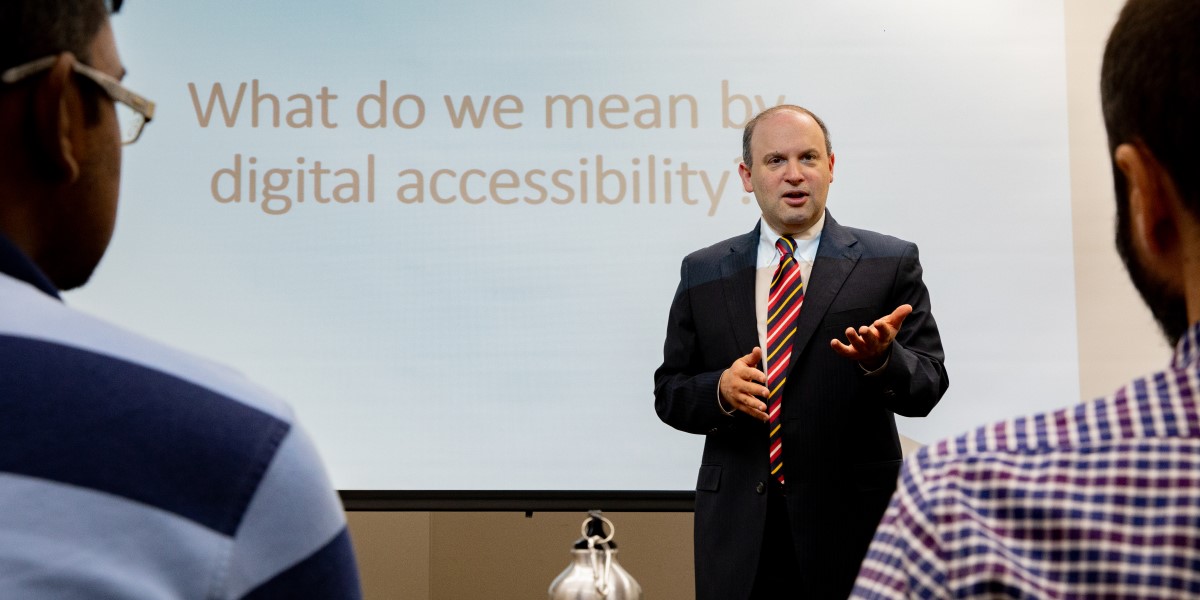As a leader in the development of and advocacy for accessible information technology, systems, and research – the UMD iSchool is represented broadly in this year’s event.

Dr. Jonathan Lazar, recipient of the ACM SIGACCESS Award for Outstanding Contributions to Computing and Accessibility, pictured lecturing on digital accessibility at the UMD iSchool (photo by Craig Taylor)
The 2020 International ACM SIGACCESS Conference on Computers and Accessibility, known as the ASSETS Conference, taking place October 26-28, is the premier forum for presenting innovative research on the design and use of both mainstream and specialized assistive technologies by people with disabilities. As a leader in the development of and advocacy for accessible information technology, systems, and research – the University of Maryland College of Information Studies (UMD iSchool) is represented broadly in this year’s event, kicking off today, across keynote speeches, awards, papers, posters, and conference committees.
Dr. Jonathan Lazar, professor at the UMD iSchool, associate director of the Trace Center, and core faculty member in the Human-Computer Interaction Lab, is the recipient of the prestigious 2020 ACM SIGACCESS Award for Outstanding Contributions to Computing and Accessibility. It is the highest award given by ACM SIGACCESS (Special Interest Group on Accessible Computing), given only once every two years, and is presented at the ASSETS Conference. The award recognizes Dr. Jonathan Lazar’s 20+ years of advocacy for digital accessibility. His contributions span research, practice, education, policy, and legal work.
Dr. Jonathan Lazar will also present the opening keynote speech at the ASSETS Conference. In the speech, Dr. Lazar will discuss how technology accessibility researchers and practitioners have been working during the pandemic to improve the quality of life for people with disabilities – ranging from tools that can help people with disabilities stay healthy to ensuring that online learning and teleconferencing can be accessible for people with various disabilities and needs.
“I want to encourage you to tap into your creativity and sense of innovation to serve the world during the pandemic. We have the power, the knowledge, and the ability to save lives and improve the quality of life for people with disabilities,” says Dr. Jonathan Lazar in his speech to the many thought leaders and researchers participating in the conference. Pre-recorded and captioned for accessibility, the speech can be viewed here.
UMD iSchool assistant professor Dr. Amanda Lazar (no relation to Dr. Jonathan Lazar) and PhD student Emma Dixon are presenting a paper at the conference, titled “The Role of Sensory changes in Everyday Technology Use by People with Mild to Moderate dementia.” The paper is part of their larger work understanding the technology needs and barriers of people with dementia, and it has received a best paper award nomination at the conference.
Emma Dixon is also participating in the ASSETS Conference’s highly selective Doctoral Consortium (on Oct 23rd) to receive feedback from peers, industry professionals, and senior members of the ASSETS community on her work around “Designing Online Self-management Resources with People with Mild to Moderate Dementia.”
Assistant professor Dr. Hernisa Kacorri – known for her work on data-driven technologies that address unique challenges faced by those with disabilities – along with UMD students will present two posters at the event, “ViScene: A Collaborative Authoring Tool for Scene Descriptions in Videos” (with HCIM student Ebrima Jarjue) and “IncluSet: A Data Surfacing Repository for Accessibility Datasets” (with PhD student Utkarsh Dwivedi, HCIM student Sravya Amancherla, and MIM students Mayanka Jha and Riya Chanduka). PhD student Jonggi Hong, HCIM student Christine Vaing, and Dr. Kacorri are also presenting their paper at the conference which was previously published in ACM Transactions on Accessible Computing (TACCESS), titled, “Reviewing Speech Input with Audio: Differences Between Blind and Sighted Users” at the conference
Dr. Kacorri and Dr. Jonathan Lazar were also instrumental to the organization of the ASSETS 2020 Conference, serving on the Organizing Committee. Dr. Kacorri served as Treasurer, and Dr. Jonathan Lazar served as Doctoral Consortium co-Chair. Both were also on the Program Committee, reviewing papers.
All of the UMD faculty and students involved in the ASSETS conference are a part of both the Trace Center and the Human-Computer Interaction Lab (HCIL). The Trace Research and Development Center, founded in 1971, is a pioneer in the field of technology and disability, known for high-impact research and development. Accessibility features developed at the Trace Center are now found in billions of devices used by people with disabilities every day internationally including every computer and mobile device using the Windows, MacOS, iOS, and Android operating systems. International technical standards for accessibility incorporate many concepts and approaches pioneered at the Trace Center. The Human Computer Interaction Lab (HCIL), founded in 1983, has a long, rich history of transforming the experience people have with new technologies. From understanding user needs, to developing and evaluating these technologies, the lab’s faculty, staff, and students have been leading the way in HCI research and teaching.
Visit the UMD school website to learn more about accessible and inclusive focused research projects, research centers, and academic programs.